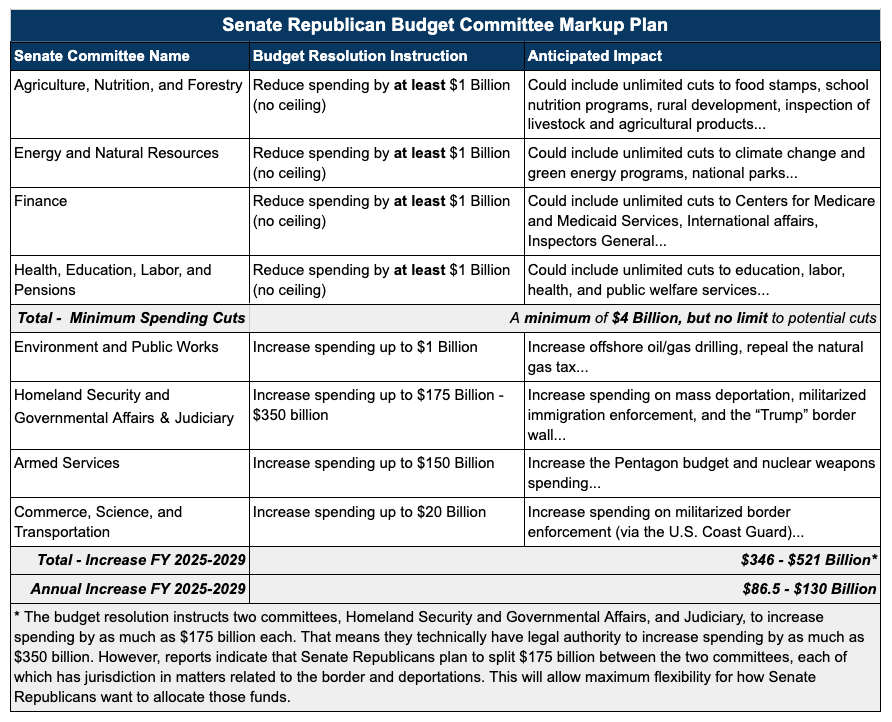BUDGET EXPLAINER: Senate Republicans Reach for Historic Levels of Militarized Spending at the Expense of Human Needs
Feb. 12, 2025 - Download PDF Version
Senate Republicans are aiming to cut federal spending on social services while increasing the budget by at least $346 billion over the next four years ($86.5 billion annually) to fund the Pentagon and a disastrous and cruel mass deportation plan. Policymakers must step up to help struggling families, not tear families apart while enriching corporations and billionaires at the expense of working people.
Background on Budget Reconciliation
The reconciliation process allows Congress to pass a budget with a simple majority, bypassing the Senate’s filibuster. While Republicans currently hold more seats in both chambers of Congress, they do not hold a filibuster-proof majority, and their divisive plans are unlikely to gain enough Democratic support. Moreover, their majorities are slim, and there are significant disagreements within the party on the amount of spending cuts, spending increases, and tax cuts to pursue.
Congressional Markups Taking Place this Week
The Senate Budget Committee released the text of their first of two budget resolutions focused on Pentagon and immigration spending on February 7, and is moving forward with a committee markup - the first step in the process toward passing reconciliation - starting February 12. The House Budget Committee announced the markup on their single resolution will take place on February 13.
Passing a budget resolution is the first step of the reconciliation process. Budget resolutions do not determine specific program cuts and do not become law themselves. Instead, they instruct Congressional committees on the overall spending adjustment they will need to make on the issues they oversee. Each Congressional committee will then use these instructions to craft individual appropriations budgets within the limits set by the budget resolution, which then must be passed in each chamber to become law.
The Senate’s Budget Resolution Adds Billions for the Pentagon and Deportations
The Senate Republicans’ budget resolution includes language that instructs Senate Committees to increase Pentagon spending by up to $150 billion and increase spending on immigration enforcement and mass deportation by between $175-$350 billion.

Simultaneously, the resolution instructs a minimum of $4 billion in cuts for working people - which may include food stamps, Medicaid, and green energy and education programs (see the table above). It is important to note these cuts are a placeholder for deeper cuts and represent the floor, not the ceiling in terms of spending cuts. Senate Republicans plan to use these open-ended instructions to cut hundreds of billions of dollars for social programs, according to a leaked memo. Official reporting from each committee about what exactly they plan to cut or increase is due back by March 7, per the budget resolution text.
Increases for Pentagon and Deportations Come At the Expense of Working People
If agreed to, this budget resolution will contain historic increases to an already overly-militarized federal budget. In FY 2024, Congress authorized a record-high $29 billion budget for immigration enforcement and border militarization. The most conservative estimate would add an additional $43.75 billion for ineffective, immigration and deportation policies annually - more than doubling the currently appropriated amounts. Pentagon spending - which is already nearly $900 billion annually and is greater than the next nine countries combined - is set to rise by an additional $37.5 billion per year for the next four years. These increases for war and deportations ($81.25 billion) are more than the GDP of at least 107 countries - more than half of all countries globally.
Rather than wasting billions of taxpayer dollars on weapons contractors, endless war, and tearing apart immigrant communities while disrupting everyday life for all Americans, policymakers could and should fund housing, healthcare, and education for people and families struggling to get by.
Learn more about the real human costs of this proposal in this factsheet.